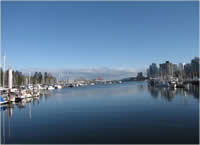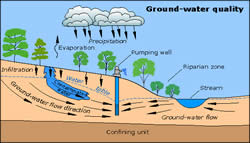Difference between Surface Water and Ground Water
Key Difference: Surface water is the water that is found on the surface of the Earth, such as lakes, ponds, oceans, etc. Ground water is water that has been seeped and stored into the ground.
Surface water and ground water are two resources through which we receive water for our purposes such as drinking, washing, cooking, etc. Before this water reaches household taps, municipal units filter this water thoroughly in order to eliminate any contaminants.
 Surface water is the water that is found on the surface of the Earth. Geography taught us that 97% of all water that is available on the Earth is salt water, while 3% is fresh water. This 3% of fresh water is what we use for our daily activities. However, surface water includes water that is found in ponds, lakes, rivers, even oceans, streams, etc. The Hydrologic Cycle, where water evaporates from the earth, turns into precipitation and then falls back in the form of rain, is responsible for replenishing the water on the surface. Surface water is classified into five different classes depending on the cleanliness of the water. Surface water is considered to be contaminated by bacteria, oil, gasoline and other water pesticides.
Surface water is the water that is found on the surface of the Earth. Geography taught us that 97% of all water that is available on the Earth is salt water, while 3% is fresh water. This 3% of fresh water is what we use for our daily activities. However, surface water includes water that is found in ponds, lakes, rivers, even oceans, streams, etc. The Hydrologic Cycle, where water evaporates from the earth, turns into precipitation and then falls back in the form of rain, is responsible for replenishing the water on the surface. Surface water is classified into five different classes depending on the cleanliness of the water. Surface water is considered to be contaminated by bacteria, oil, gasoline and other water pesticides.
 Ground water is water that has been seeped and stored into the ground. At the beach, notice the deeper you dig the more amount of water you uncover, this is similar to that. The water is located beneath the earth's surface in soil pores and in stone fractures, which are known as aquifers. Aquifers can hold a large amount of water, which when it is full, it over flows back into rivers and ponds. Groundwater is water that has been seeped into the ground as a result of overflowing lakes, ponds and rain water that first seeps into the ground before running off into nearby bodies of water. According to research estimates, groundwater makes up around 20% of the world's fresh water supply. Due to over usage of groundwater, in many places ground water aquifers have dried up resulting in the land itself to become dry. Ground water is also contaminated in many areas due to pollutants, pesticides and other chemicals that are added to the land, which are absorbed into the Earth.
Ground water is water that has been seeped and stored into the ground. At the beach, notice the deeper you dig the more amount of water you uncover, this is similar to that. The water is located beneath the earth's surface in soil pores and in stone fractures, which are known as aquifers. Aquifers can hold a large amount of water, which when it is full, it over flows back into rivers and ponds. Groundwater is water that has been seeped into the ground as a result of overflowing lakes, ponds and rain water that first seeps into the ground before running off into nearby bodies of water. According to research estimates, groundwater makes up around 20% of the world's fresh water supply. Due to over usage of groundwater, in many places ground water aquifers have dried up resulting in the land itself to become dry. Ground water is also contaminated in many areas due to pollutants, pesticides and other chemicals that are added to the land, which are absorbed into the Earth.
Surface water and ground water are both responsible for the water that we use. Ground water is also acquired through wells and other water pumps, while surface water is easily accessible. However, both the bodies of water contain contaminants and should be thoroughly filtered and boiled in order to disinfect it and make it consumable. Surface water such as oceans, have way too much salt content in order to be consumable by humans, animals or plants.
Image Courtesy: greentimes.com.au, ga.water.usgs.gov









Add new comment